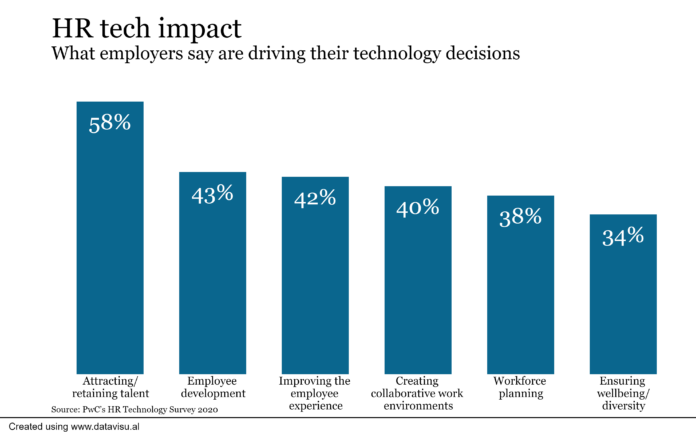It appears employers will be opening up their checkbooks in 2020 for HR technology, according to a new survey that reports seven out of 10 companies plan to boost spending on HR tech this year.
The new PwC global survey of 600 HR and IT leaders found that the projected financial investment is designed to address human capital challenges that keep rising on CEOs’ agendas, including recruiting, staff development and workforce expectations about technology. On the other hand, adoption challenges related to these investments remain a serious barrier, cited by 82% of respondents.
Dan Staley, global HR technology leader at PwC, explains that, while the C-suite is optimistic about the value of new technology, eight in 10 users struggle with adoption challenges; additionally, the C-suite is twice as likely as managers to say these tools are actually effective.
“Although the rising number of companies with core HR technologies in the cloud are likely to report increased productivity, improved employee experience and better workforce insights,” Staley says, “there’s more work to do to enable and motivate people to commit to using these tools to change the ways they work and develop in their careers.”
Related: Do you know how to drive HR-tech adoption?
To address this disconnect and increase the effectiveness of these portfolios for all, Staley says, it’s smart to start with the basics, including:
- Answer the right questions. Get the right people in the room to determine the business problem to solve, and engage front-line employees to solve it. This will allow for better matching of technologies with needs.
- Increase the use of adoption techniques, such as gamification and incentives, to encourage the workforce to learn and make new tech part of their day-to-day routines.
- Get feedback during and after the implementation of new technology. Provide mechanisms for employees to offer suggestions on what is working and not working so that applications can be improved upon.
Another area of concern in the survey? About 80% of companies plan to implement artificial intelligence for their HR organizations over the next two years. As of today, however, 63% of companies have not yet implemented done so, primarily because they have not yet zeroed in on the right use case.
“It is important for organizations to identify the business problem before jumping straight to a technology solution,” Staley says.
The PwC research surfaced six main issues driving HR-tech expansion in 2020:
- Finding, attracting and retaining talent (58%)
- Developing people to reach their full potential (43%)
- Improving the employee experience (42%)
- Creating a collaborative work environment (40%)
- Workforce planning (38%)
- Ensuring wellbeing, inclusion and diversity (34%)
“Updating the candidate and employee experience is especially important for companies trying to fill critical talent gaps,” Staley says. “Employers know that job seekers, particularly in high-demand fields, will turn down offers due to bad recruiting experiences, and they can’t take that chance.”



